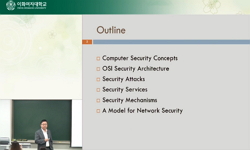In recent years, a satellite navigation signal authentication technique has been introduced to determine the spoofing of commercial C/A code using the cross-correlation mode of GPS P(Y) code received at two receivers. This paper discusses the technica...
http://chineseinput.net/에서 pinyin(병음)방식으로 중국어를 변환할 수 있습니다.
변환된 중국어를 복사하여 사용하시면 됩니다.
- 中文 을 입력하시려면 zhongwen을 입력하시고 space를누르시면됩니다.
- 北京 을 입력하시려면 beijing을 입력하시고 space를 누르시면 됩니다.
https://www.riss.kr/link?id=A105896504
- 저자
- 발행기관
- 학술지명
- 권호사항
-
발행연도
2018
-
작성언어
English
- 주제어
-
등재정보
KCI등재
-
자료형태
학술저널
-
수록면
139-146(8쪽)
-
KCI 피인용횟수
0
- DOI식별코드
- 제공처
-
0
상세조회 -
0
다운로드
부가정보
다국어 초록 (Multilingual Abstract)
In recent years, a satellite navigation signal authentication technique has been introduced to determine the spoofing of commercial C/A code using the cross-correlation mode of GPS P(Y) code received at two receivers. This paper discusses the technical considerations in the implementation and application of authentication system simulator hardware to achieve the above technique. The configuration of the simulator consists of authentication system and user receiver. The synchronization of GPS signals received at two devices, data transmission and reception, and codeless correlation of P(Y) code were implemented. The simulation test result verified that spoofing detection using P(Y) codeless correlation could be achieved.
참고문헌 (Reference)
1 John, A., "Vulnerability assessment of the transportation infrastructure relying on the Global Positioning System, Technology Report" 2001
2 Kaplan, E. D., "Understanding GPS: Prin- ciples and Applications" Artech House Inc. 2006
3 Humphreys, T. E., "Statement on the vulnerability of civil unmanned aerial vehicles and other systems to civil GPS spoofing"
4 Lo, S., "Signal authentication: A secure civil GNSS for today" Inside GNSS 2009
5 Spirent Communications, "SIMSAFE user manual" Spirent Communications 2013
6 Jafarnia-Jahromi, A., "GPS vulnerability to spoofng threats and a review of antispoofing techniques" 1-16, 2012
7 Dovis, F., "GNSS Interference threats and counter-measures" Artech House 2015
8 Psiaki, M. L., "Civilian GPS spoofng detection based on dual-receiver correlation of military signals" 2011
1 John, A., "Vulnerability assessment of the transportation infrastructure relying on the Global Positioning System, Technology Report" 2001
2 Kaplan, E. D., "Understanding GPS: Prin- ciples and Applications" Artech House Inc. 2006
3 Humphreys, T. E., "Statement on the vulnerability of civil unmanned aerial vehicles and other systems to civil GPS spoofing"
4 Lo, S., "Signal authentication: A secure civil GNSS for today" Inside GNSS 2009
5 Spirent Communications, "SIMSAFE user manual" Spirent Communications 2013
6 Jafarnia-Jahromi, A., "GPS vulnerability to spoofng threats and a review of antispoofing techniques" 1-16, 2012
7 Dovis, F., "GNSS Interference threats and counter-measures" Artech House 2015
8 Psiaki, M. L., "Civilian GPS spoofng detection based on dual-receiver correlation of military signals" 2011
동일학술지(권/호) 다른 논문
-
Accuracy Comparison of GPT and SBAS Troposphere Models for GNSS Data Processing
- 사단법인 항법시스템학회
- 박관동
- 2018
- KCI등재
-
- 사단법인 항법시스템학회
- 최병규
- 2018
- KCI등재
-
IMM-based INS/EM-Log Integrated Underwater Navigation with Sea Current Estimation Function
- 사단법인 항법시스템학회
- 조성윤
- 2018
- KCI등재
-
- 사단법인 항법시스템학회
- 노희권
- 2018
- KCI등재
분석정보
인용정보 인용지수 설명보기
학술지 이력
| 연월일 | 이력구분 | 이력상세 | 등재구분 |
|---|---|---|---|
| 2026 | 평가예정 | 재인증평가 신청대상 (재인증) | |
| 2020-01-01 | 평가 | 등재학술지 유지 (재인증) |  |
| 2017-01-24 | 학회명변경 | 한글명 : 한국위성항법시스템학회 -> 사단법인 항법시스템학회영문명 : The Korean GNSS Society -> The Institute of Positioning, Navigation, and Timing |  |
| 2017-01-01 | 평가 | 등재학술지 선정 (계속평가) |  |
| 2015-01-01 | 평가 | 등재후보학술지 선정 (신규평가) |  |
학술지 인용정보
| 기준연도 | WOS-KCI 통합IF(2년) | KCIF(2년) | KCIF(3년) |
|---|---|---|---|
| 2016 | 0.27 | 0.27 | 0.21 |
| KCIF(4년) | KCIF(5년) | 중심성지수(3년) | 즉시성지수 |
| 0.18 | 0 | 0.446 | 0.04 |





 KCI
KCI






